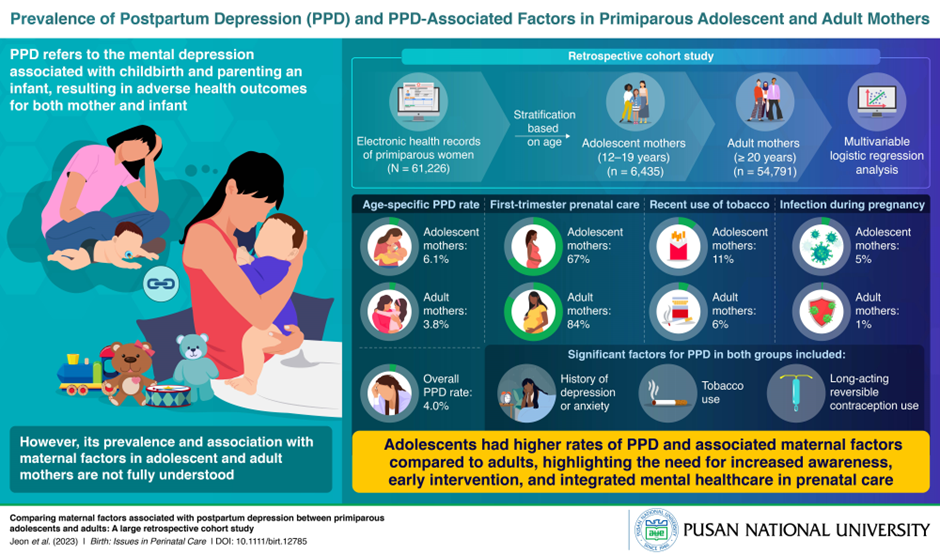
Pusan National University Study Finds First-time Teen Moms at Higher Risk of Postpartum Depression
The prevalence of postpartum depression and various maternal factors associated with it were evaluated using healthcare data of first-time mothers
Postpartum depression (PPD), a state of clinical depression that affects women after childbirth, can be detrimental to both mother and the newborn. A new research study from Pusan National University sheds light on the prevalence and influence of maternal factors of PPD in first-time adolescent mothers. They found that first-time adolescent mothers had a higher prevalence of PPD. Targeted interventions along with increased access to prenatal care can be effective for management of PPD.

Image title: Postpartum depression in primiparous adolescents and adults.
Image caption: Integrating mental health care into prenatal care, particularly for adolescent mothers, can help reduce the incidence, risk, and severity of PPD.
Image credit: Assistant Professor Nakyung Jeon from Pusan National University, South Korea
License type: Original Content
Usage restrictions: Cannot be reused without permission
Postpartum depression (PPD) is a clinical condition that affects women after childbirth, typically starting within a few weeks postpartum. It is characterized by intense feelings of anxiety, sadness, and fatigue, which can be prolonged. PPD can have adverse effects on both the mother and the newborn, leading to negative health outcomes and impaired parenting practices. Over the years, research has linked PPD to a combination of individual and societal factors, categorizing these influences into demographic, clinical, socioeconomic, and psychological factors. Despite numerous studies, the prevalence of PPD and the impact of maternal factors on first-time adolescent mothers remain poorly understood.
To fill in the research gap, a team of researchers have endeavored to assess the relationship between maternal factors and the development of PPD in first-time adolescent and adult mothers. The team led by Assistant Professor Nakyung Jeon from the College of Pharmacy, Pusan National University, South Korea conducted a retrospective study and stratified first-time mothers into adolescents (12–19 years) and adult mothers (20 years or greater) based on their ages. Additionally, they evaluated the influence of different maternal factors associated with PPD in both groups. Their research findings were made available online on 18 October 2023 and was formally published in Volume 51, Issue 1 of Birth: Issues in Perinatal Care journal in March 2024.
Initially, the researchers utilized first-time mothers' electronic health records and linked them to other healthcare and population databases. Subsequently, they conducted statistical analysis to evaluate the maternal factors and prevalence of PPD. They found that PPD amongst first time mothers was more predominant in adolescent mothers by 1.5 times when compared to adult mothers. Alarmingly, their analysis showed that adolescent mothers were less likely to avail first trimester prenatal care, more likely to use tobacco products and have an infection during pregnancy.
“Our study underscores the importance of integrating mental health care into prenatal care, particularly for adolescents, to help reduce the risk and severity of PPD. Healthcare providers can develop and implement enhanced prenatal care programs specifically tailored for adolescent mothers, focusing on early detection and management of risk factors associated with PPD. These programs can include routine mental health screenings, counselling services, and education on the importance of prenatal care”, says Dr. Jeon, highlighting the need for increased access, awareness and education regarding prenatal services for younger mothers.
Additionally, the researchers found that clinical history of depression or anxiety, use of tobacco during pregnancy, and the use of long-acting reversible contraception were significant and key risk factors for PPD in both adolescent and adult mothers.
Public health campaigns and awareness programs to educate young mothers and their families about the risks of PPD and the importance of seeking help along with increased access to mental healthcare and extended medical insurance coverage beyond the postpartum period can prove to be vital for the effective prevention and management of PPD in first-time adolescent mothers.
Emphasizing the long-term implications of the research study, Dr. Jeon shares, “Early detection and intervention for PPD, particularly among adolescent mothers, can improve the overall health outcomes for both mothers and their children. Furthermore, by addressing mental health issues early, we can prevent the progression of severe mental health problems, reducing the need for intensive treatments along with decreased healthcare costs.”
This large cohort study highlights the urgent need for extensive support and targeted interventions for first-time adolescent mothers during prenatal and postpartum periods to mitigate higher PPD risks.
Reference
Title of original paper: Comparing maternal factors associated with postpartum depression between primiparous adolescents and adults: A large retrospective cohort study
Journal: Birth: Issues in Perinatal Care
DOI: 10.1111/birt.12785
About the institute
Pusan National University, located in Busan, South Korea, was founded in 1946 and is now the No. 1 national university of South Korea in research and educational competency. The multi-campus university also has other smaller campuses in Yangsan, Miryang, and Ami. The university prides itself on the principles of truth, freedom, and service, and has approximately 30,000 students, 1200 professors, and 750 faculty members. The university is composed of 14 colleges (schools) and one independent division, with 103 departments in all.
Website: https://www.pusan.ac.kr/eng/Main.do
About the author
Dr. Nakyung Jeon is an Assistant Professor at the College of Pharmacy, Pusan National University, South Korea. Her research as a pharmacoepidemiologist focuses on health outcomes research utilizing real-world healthcare big data. Her group is developing and applying analytical approaches to generate real-world evidence to improve patient care. These approaches include classic statistical models to AI-driven methods using various healthcare data. Dr. Jeon received her PhD in Pharmaceutical Outcomes and Policy from the University of Florida in 2017. Her findings have been published in reputed scientific journals, and she has received recognition for her work in the field of pharmacoepidemiology.

 PURCS_123_Infographic_final.jpg
(2MB)
PURCS_123_Infographic_final.jpg
(2MB)